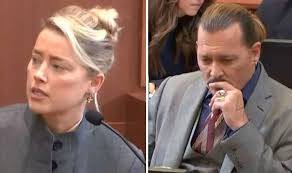An extensive legal memorandum was filed in a Fairfax, Virginia court on Friday, July 1.
In the 43-page filing, Heard’s attorneys say the massive judgment is not supported by the evidence presented during their dramatic, six-week-long trial watched around the world. Specifically, the filing argues there is no evidence of pecuniary damages from the op-ed at the heart of the dispute.
That Dec. 18, 2018 Washington Post op-ed was reviewed by ACLU attorneys prior to publication but appeared under Heard’s name. The piece did not mention Depp by name but recounted her role as a “public figure representing domestic abuse” survivors and honed in on a period when she took out a temporary restraining order against the “Fear and Loathing in Las Vegas” actor. (The piece, which remains online, now carries an editor’s note that indicates that a Virginia jury found that three of its statements were defamatory, including the headline.)
During the trial, Depp argued — and jurors believed — the op-ed was about him. The general counsel for the ACLU would later admit that after reading early drafts of the piece, it was clear that the piece was all about Depp.
Heard’s attorneys say the damages Depp claimed from that article — that he lost out on the opportunity to reprise his role as the pirate Jack Sparrow for the sixth time — do not hold up under scrutiny.
“While Mr. Depp asserted he lost Pirates 6 because of the Op-Ed, there is no evidence upon which the jury can rely to reach such a conclusion,” the memo argues. “Mr. Depp did not have a contract for Pirates 6, there was media coverage that Mr. Depp would not be in Pirates 6 as of October 25, 2018 – two months before the Op-Ed, Mr. Depp’s agent testified that it was very likely Mr. Depp would not be in Pirates 6 as of the Fall 2018, and Mr. Depp testified that he would not have agreed to play a role in Pirates 6 for ‘$300 million and a million alpacas.'”
In her memo, Heard also claims that Depp did not prove actual malice – the heightened standard in defamation cases that applies when the allegedly defamed person is a public figure.
“In this case, proving actual malice required showing that, at the time the Op-Ed was published, Ms. Heard did not believe she was abused or that she ‘entertained serious doubt’ about whether she was abused,” the filing says. “[B]ecause actual malice is a subjective standard, whether Ms. heard believes she was abuse must be judged by her definition of abuse. Ms. Heard testified unequivocally that Mr. Depp abused her physically, emotionally, and psychologically. Mr. Depp presented no evidence that Ms. Heard does not believe abuse can be physical, emotional, or psychological.”
In returning the verdict for Depp, however, jurors said they did not believe Heard – essentially agreeing with Depp that her abuse claims were false and that she spread them with actual malice, that she lied and that she knew she was lying about the situation.
In an interview with Good Morning Americafollowing the verdict, one of the jurors said they felt Heard’s performance during the trial was more or less exactly that: a performance suffuse with “crocodile tears.”
“It didn’t come across as believable,” the anonymized juror said. “It seemed like she was able to flip the switch on her emotions. She would answer one question and she would be crying and two seconds later she would turn ice cold. It didn’t seem natural.”
There is also an allegation that one of the jurors who delivered the verdict (largely) in Depp’s favor engaged in an impropriety by serving on the jury at all. Heard’s attorneys are asking the court to investigate.




No comments yet
Be the first to share your thoughts!